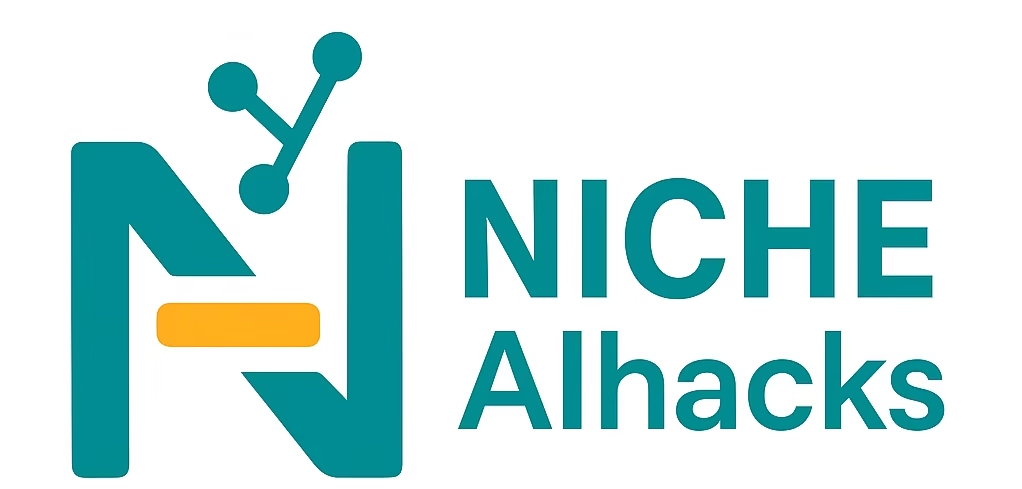GPT-5: Release, Features, Benchmarks & Pricing (2025 Guide)
A verified, hype-free briefing on OpenAI’s latest flagship GPT-5 —what’s confirmed, what’s not, how it compares to Claude & Gemini, and how to prep your team.
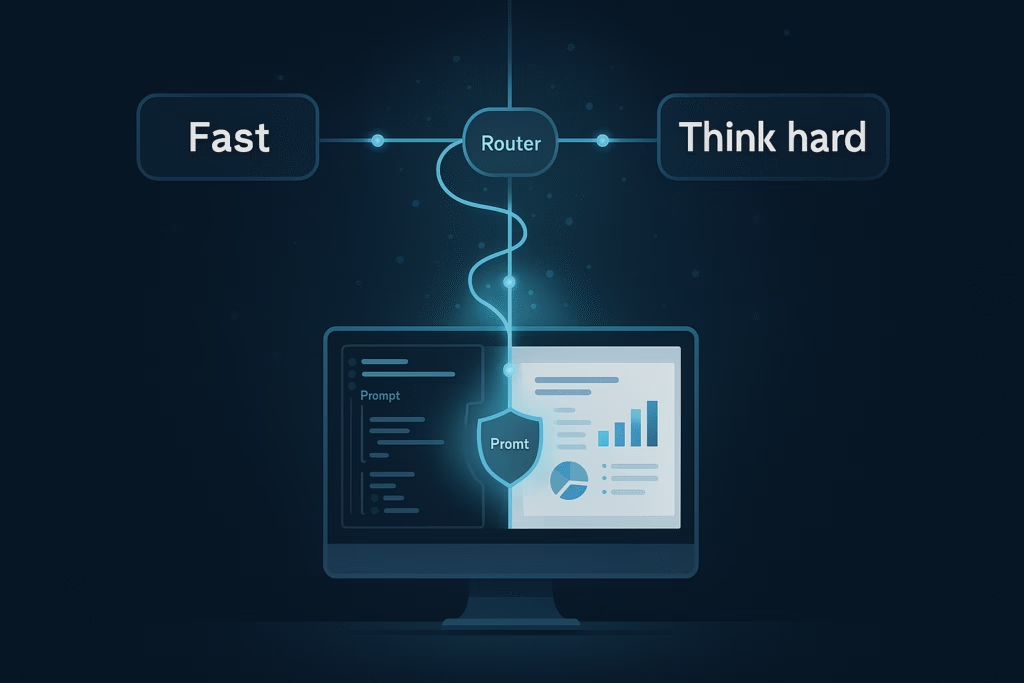
Key confirmations:
- Availability: in ChatGPT (free with usage caps; higher limits for Plus/Team/Enterprise) and across API as
gpt-5,gpt-5-mini,gpt-5-nano. (Source: OpenAI; Wired) OpenAIWIRED - Context window (API): up to 400K tokens (272K input, 128K reasoning/output). (Source: OpenAI) OpenAI
- Focus areas: coding, front-end generation, long multi-step tool use (agents), improved instruction-following and factuality. (Source: OpenAI) OpenAI
- Enterprise rollout: Microsoft added GPT-5 to Copilot (including Microsoft 365 Copilot, Copilot Studio and Azure AI). (Source: Microsoft; The Verge) MicrosoftThe Verge
Expert POV: “This is the best model in the world at coding and writing.” — Sam Altman, CEO, in press briefing reported by The Verge (Aug 7, 2025). The Verge
GPT-5: Fast when you need speed, deep when you need reasoning
- GPT-5 is live in ChatGPT and in the API; Microsoft added it to Copilot the same day (The Verge; Microsoft 365 blog).
- Headlines: stronger coding & “agentic” task execution, long-context (up to 400K tokens in the API), and an automatic router in ChatGPT that decides when to “think hard” vs. go fast (OpenAI; The Verge).
- API pricing: GPT-5 $1.25/M input and $10/M output tokens; Mini and Nano are cheaper (OpenAI).
- Early benchmarks (OpenAI): SWE-bench Verified 74.9%; Aider Polyglot 88%; τ²-bench (tool use, telecom) 96.7%.
- Safety: shift from hard refusals to safe-completions; fewer hallucinations; still not AGI or continuously learning (OpenAI; major press).
Table of Contents
- What is GPT-5?
- What’s new vs GPT-4/4o
- Expert takes
- Potential use-cases
- Pricing & availability
- Benchmarks (sourced)
- Safety, policy & compliance
- Competitive landscape
- Getting ready for GPT-5 (checklist + pros/cons)
- FAQs
1) What is GPT-5?
OpenAI’s GPT-5 is the new flagship across ChatGPT and the API. In ChatGPT, a router quietly decides whether to answer quickly or invoke deeper reasoning, so most users don’t have to pick models manually (OpenAI; The Verge). Microsoft rolled GPT-5 into Microsoft 365 Copilot and Copilot Studio on day one for enterprise scenarios (Microsoft 365 blog).
Sources: OpenAI overview; developers post; The Verge; Microsoft 365 blog. OpenAI+1The VergeMicrosoft
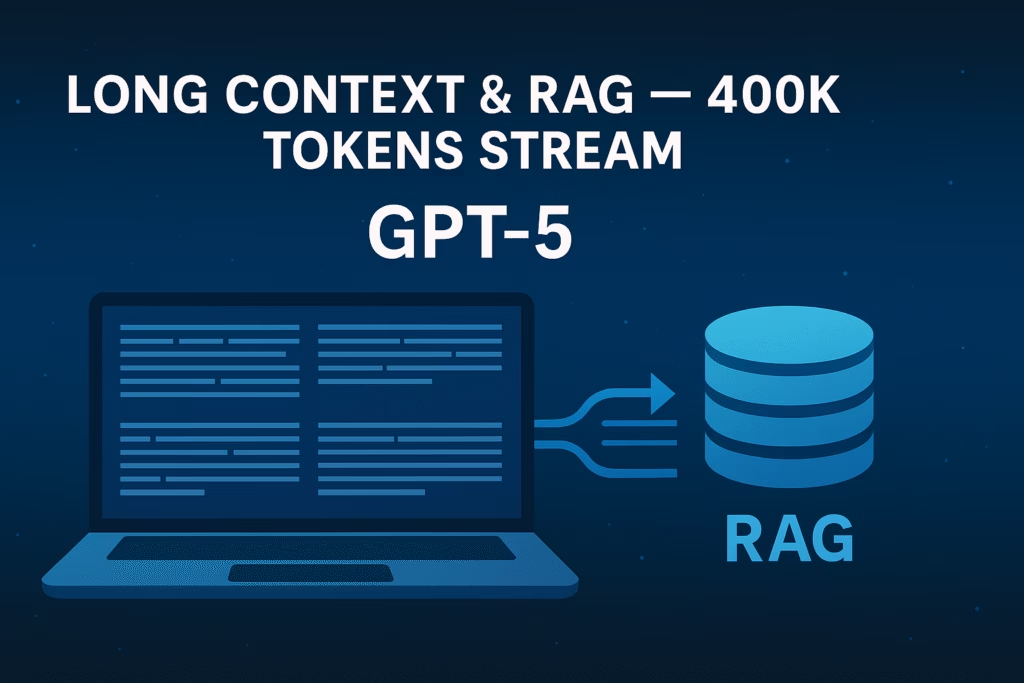
2) What’s new vs GPT-4/4o
Highlights
- Long context in API (up to 400K tokens; max output 128K).
- Agentic tool use with better sequential/parallel calls; stronger front-end/code generation.
- New controls:
reasoning_effortandverbosity. - In ChatGPT, the router reduces UX friction for casual users (OpenAI; Business Insider).
Quick comparison (skimmable)
- GPT-5 → Text & vision (voice in ChatGPT), up to 400K tokens; excels at coding, UI generation, and multi-step tool use (OpenAI).
- GPT-4o → Real-time text/vision/audio with very low latency; great for live audio/vision (OpenAI).
- Claude 3.5 Sonnet → Text+image; 200K context; strong writing/coding (Anthropic).
- Gemini 2.5 Pro → Native multimodal; 1M context (2M “coming soon” per Google) (Google).
Sources: OpenAI model + dev posts; Anthropic; Google; Business Insider UX angle. OpenAI+4OpenAI+4OpenAI+4Business Insider
3) Expert takes
- Sam Altman (OpenAI) told press GPT-5 is a “significant step,” yet still not AGI; the big win is practicality (The Verge).
- Nick Turley (Head of ChatGPT) said “the vibes are really good,” pointing to the router’s benefit for everyday users (The Verge).
- Jared Spataro (Microsoft): Copilot routes to GPT-5’s deeper reasoning when prompts demand it (Microsoft 365 blog).
Sources: The Verge; Microsoft 365 blog. The VergeMicrosoft
4) Potential use-cases
Developers & product
- Generate front-ends, components, and internal tools from a short brief; cleaner diffs and fewer tool-calling errors (OpenAI dev post).
- Agentic chains for RAG, ETL, research, and automation with better sequential/parallel tool calling (OpenAI dev post).
Marketing & sales
- Multi-format campaign sets (ads, landing pages, outreach) from one brief; Copilot brings work context (Microsoft 365 blog).
Support & ops
- Long-context case reviews; safer guidance on sensitive queries via safe-completions (OpenAI system card/safety note).
Sources: OpenAI dev + safety notes; Microsoft. OpenAI+1Microsoft
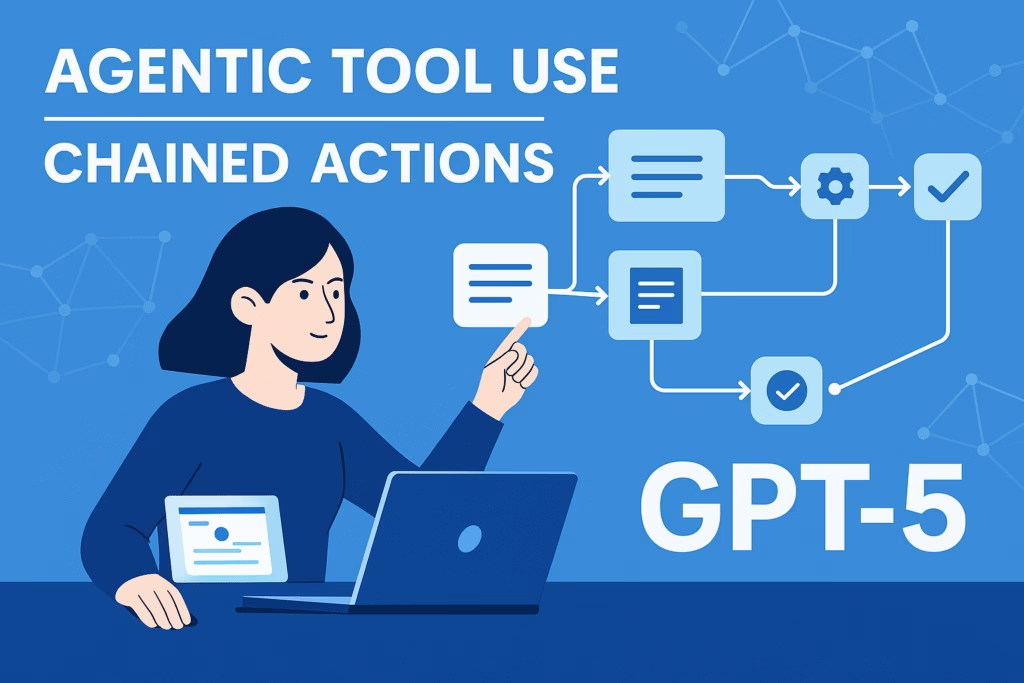
5) Pricing & availability
- ChatGPT: GPT-5 available to free users with caps; higher tiers raise limits (major press coverage).
- API:
gpt-5$1.25/M input and $10/M output;gpt-5-mini$0.25/$2;gpt-5-nano$0.05/$0.40 (OpenAI dev post). - Enterprise: Microsoft 365 Copilot & Copilot Studio support GPT-5 now (Microsoft 365 + Tech Community blogs).
Sources: OpenAI developer pricing; Wired/The Verge for availability context; Microsoft 365 + Tech Community. OpenAIThe VergeMicrosoftTECHCOMMUNITY.MICROSOFT.COM
6) Benchmarks (sourced)
OpenAI reports:
- SWE-bench Verified: 74.9% (bug-fix tasks).
- Aider Polyglot: 88% (code editing diffs).
- τ²-bench (telecom tool-use): 96.7%.
Methodology and safety evaluation details are in the GPT-5 system card; independent replications will take time.
What’s New vs GPT-4/4o (and a quick competitor)
At a glance: more reliable reasoning, bigger context in API, new safety training, and a developer-friendly API with verbosity and reasoning_effort controls. (Source: OpenAI) OpenAI
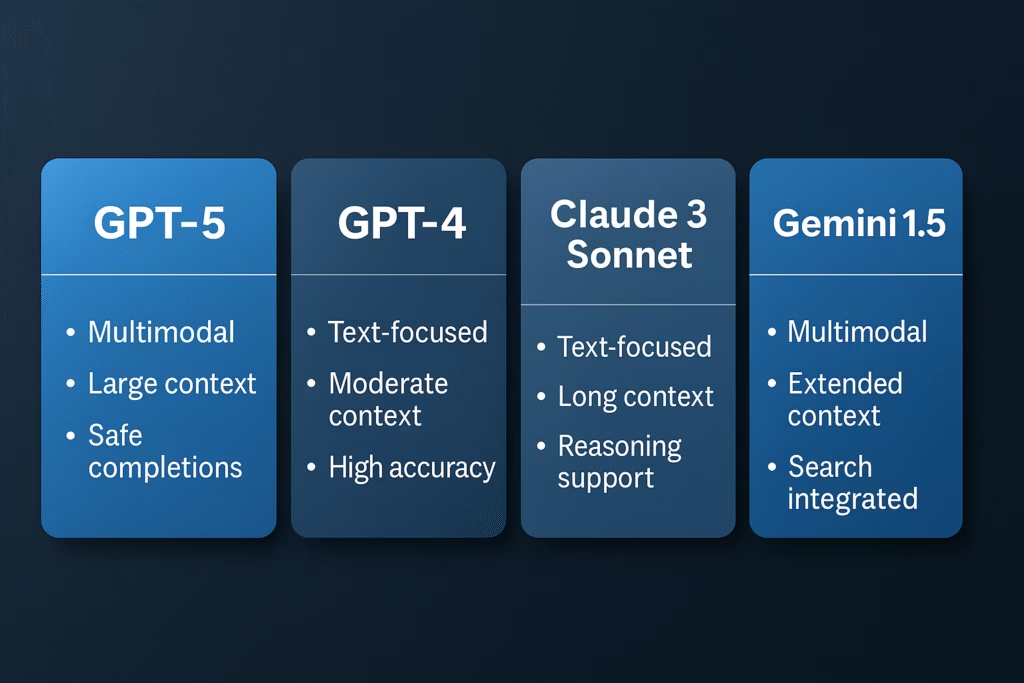
Feature comparison
| Model | Modality (core) | Max context (API) | Latency class | Notable capabilities | Source/date |
|---|---|---|---|---|---|
| GPT-5 | Text & Vision (Voice in ChatGPT) | 400K (272K in + 128K out) | Reasoning + fast paths via router | Agentic tool use, front-end/UI generation, verbosity & reasoning_effort, custom tools | OpenAI (Aug 2025) (OpenAI) |
| GPT-4o | Real-time text, vision, audio | — | Low-latency multimodal | Strong live vision/audio, cheaper than GPT-4 Turbo at launch | OpenAI (May 2024) (OpenAI) |
| Claude 3.5 Sonnet | Text, image | 200K | Fast/steady | Strong writing & coding; widely used via Bedrock/Vertex | Anthropic (Jun–Aug 2024) (Anthropic, Amazon Web Services, Inc.) |
| Gemini 2.5 Pro | Native multimodal (text, image, audio, video) | 1M (2M “coming soon”) | Multiple tiers | Long-context analysis and deep research modes | Google (Mar 2025) (blog.google) |
Sources: OpenAI dev post; system card. OpenAI+1
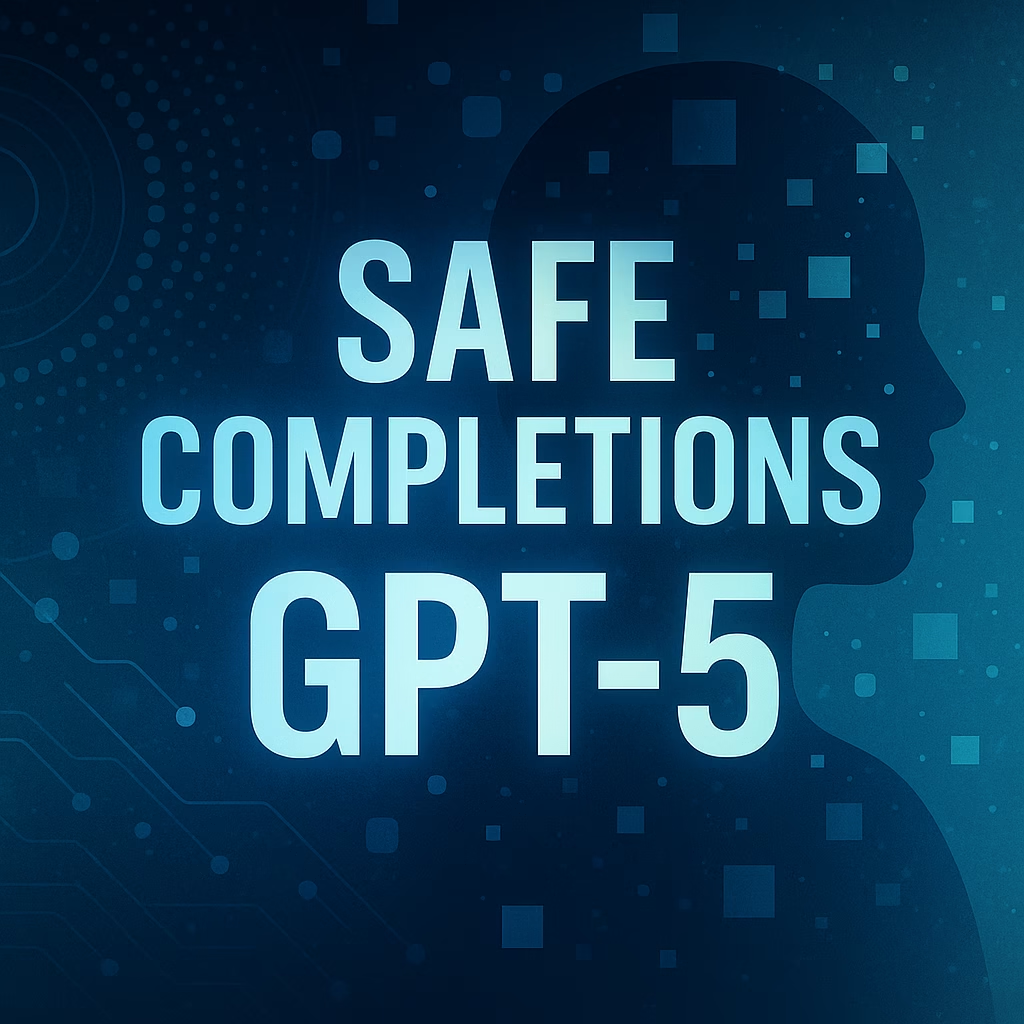
7) Safety, policy & compliance
OpenAI is moving from blanket refusals to safe-completions—staying helpful within constraints on sensitive/dual-use prompts. The system card cites reduced hallucinations and more honest behavior vs earlier models. OpenAI leadership and outside coverage stress GPT-5 is not AGI and does not learn continuously after deployment.
Practical tips: scope tools/retrieval; log tool calls; PII redaction/DLP where required; keep human review for regulated outputs.
Sources: OpenAI system card + safe-completions; The Vergecast discussion. OpenAIThe Verge
8) Competitive landscape (neutral)
- Anthropic Claude 3.5 Sonnet — 200K context; strong long-form reliability; widely available via Bedrock/Vertex.
- Google Gemini 2.5 Pro — native multimodality; 1M context (2M “coming soon”); deep research focus.
Positioning: GPT-5 leans into agentic coding + router UX; Claude emphasizes consistency in long-form tasks; Gemini pushes ultra-long context.
Sources: Anthropic; Google. OpenAI+1
9) Getting ready for GPT-5
Quick-start checklist
- Map GPT-4/4o calls →
gpt-5family (gpt-5,mini,nano). - Add
reasoning_effort+verbosity; log cost/latency trade-offs. - Harden tool calling (sequential/parallel), add retries/guardrails.
- Validate long-context (64K → 400K) with your data and retrieval.
- Update UX copy to explain safe-completions and escalation paths.
- Turn on prompt caching/batch where it fits.
Pros
- Stronger coding & agentic tasks; long-context API; safer answers; broad ecosystem (ChatGPT, Copilot).
Cons
- Higher costs without routing/controls; still imperfect hallucination control; not AGI.
Sources: OpenAI dev + system card; Microsoft 365 blog. OpenAI+1Microsoft

10) FAQs
What is GPT-5?
OpenAI’s latest flagship for ChatGPT and the API, emphasizing coding, agentic tool use, and safer responses (OpenAI). OpenAI
Is GPT-5 available to free users?
Yes, with usage caps; paid tiers raise limits (The Verge/Wired coverage). The Verge
What’s the context window?
Up to 400K tokens in the API; 128K max output (OpenAI). OpenAI
How much does GPT-5 cost in the API?
$1.25/M input and $10/M output tokens; Mini and Nano are cheaper (OpenAI). OpenAI
Is GPT-5 better at coding?
OpenAI reports 74.9% on SWE-bench Verified and other gains (OpenAI). OpenAI
Does GPT-5 replace GPT-4o?
In ChatGPT, the router picks the path; 4o remains available in some products (The Verge). The Verge
What is “safe-completions”?
A method to give helpful, constrained answers on sensitive queries rather than blunt refusals (OpenAI). OpenAI
Can GPT-5 learn continuously after deployment?
No—OpenAI and coverage note it doesn’t continuously learn post-deployment (press/system card). The Verge
Is GPT-5 in Microsoft Copilot / Copilot Studio?
Yes—rolling out now across Microsoft 365 Copilot and Copilot Studio (Microsoft 365 + Tech Community blogs). MicrosoftTECHCOMMUNITY.MICROSOFT.COM
How does GPT-5 compare to Claude/Gemini?
GPT-5 emphasizes agentic coding + router UX; Claude 3.5 offers 200K context; Gemini 2.5 Pro offers 1M context (Anthropic; Google). OpenAI+1
Conclusion
GPT-5 is a meaningful upgrade: better code, more stable tool use, longer context, and an interface that hides model complexity. It’s not magic—safety isn’t solved and it’s not AGI—but it’s a practical step forward for teams that ship with AI. Start migrating targeted workloads, measure cost/latency with the new knobs, and keep a human review loop wherever stakes are high.
References
Google — Gemini 2.5: Our most intelligent AI model (Mar 25, 2025). https://blog.google/technology/google-deepmind/gemini-model-thinking-updates-march-2025/ blog.google
OpenAI — GPT-5 is here (Aug 7, 2025). https://openai.com/gpt-5/ OpenAI
OpenAI — Introducing GPT-5 for developers (Aug 7, 2025). https://openai.com/index/introducing-gpt-5-for-developers/ OpenAI
OpenAI — GPT-5 system card & Safe-completions (Aug 7, 2025). https://openai.com/index/gpt-5-system-card/ ; https://openai.com/index/gpt-5-safe-completions/ OpenAI+1
The Verge — GPT-5 is being released to all ChatGPT users (Aug 7, 2025). https://www.theverge.com/openai/748017/gpt-5-chatgpt-openai-release The Verge
Microsoft 365 Blog — Available today: GPT-5 in Microsoft 365 Copilot (Aug 7, 2025). https://www.microsoft.com/en-us/microsoft-365/blog/2025/08/07/available-today-gpt-5-in-microsoft-365-copilot/ Microsoft
GitHub — GPT-5 public preview for GitHub Copilot (Aug 7, 2025). https://github.blog/changelog/2025-08-07-openai-gpt-5-is-now-in-public-preview-for-github-copilot/ The GitHub Blog
Wired — OpenAI finally launched GPT-5 (Aug 7, 2025). https://www.wired.com/story/openais-gpt-5-is-here/ WIRED
The Guardian — OpenAI says latest ChatGPT upgrade is big step… but still can’t do humans’ jobs (Aug 7, 2025). https://www.theguardian.com/technology/2025/aug/07/openai-chatgpt-upgrade-big-step-forward-human-jobs-gpt-5 The Guardian
Anthropic — Introducing Claude 3.5 Sonnet (Jun 20, 2024). https://www.anthropic.com/news/claude-3-5-sonnet Anthropic
